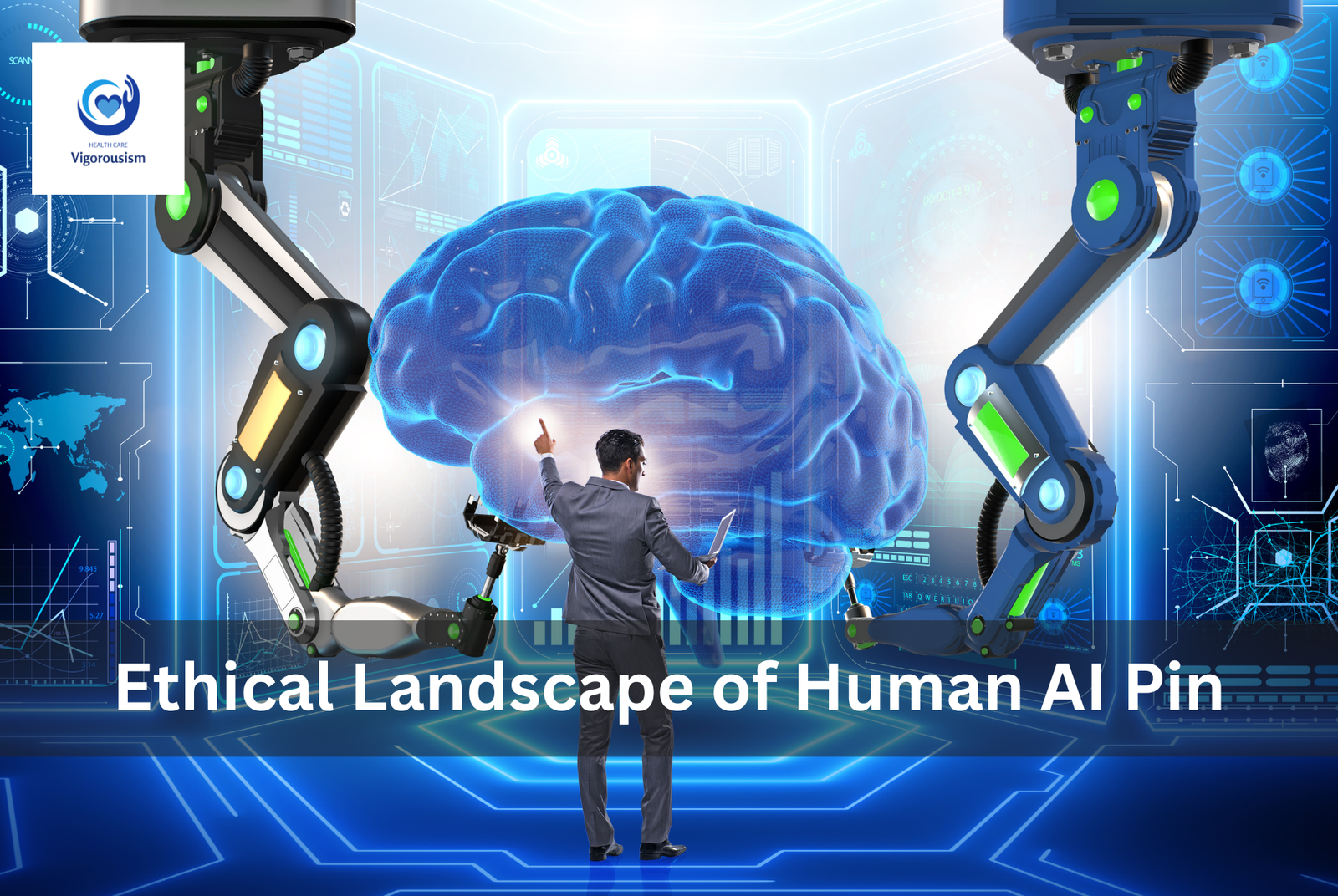In our rapidly evolving technological landscape, the Ethical Landscape of Human AI Pin has become a transformative force, shaping industries and influencing our daily lives. As we embark on this journey of innovation, it is imperative to navigate the ethical landscape that accompanies the development and deployment of AI technologies. The delicate balance between pushing the boundaries of innovation and shouldering the responsibility for the ethical implications of these advancements is a critical concern.
In this article we embark on a journey to unravel the complexities of navigating the ethical landscape of human AI Pin, striving for a harmonious coexistence of cutting-edge technology and ethical responsibility. From issues of privacy and bias to the broader societal impacts, understanding and addressing the ethical dimensions of human AI is essential for ensuring a future where innovation enhances the human experience without compromising our values and principles.
The Unprecedented Rise of Human AI
The advent of human AI marks a paradigm shift in how we interact with technology. From virtual assistants and personalized recommendations to autonomous vehicles and predictive analytics, AI is seamlessly integrating into our daily lives. This integration brings forth immense benefits, enhancing efficiency, automating tasks, and providing solutions to previously insurmountable challenges. However, with great technological power comes an even greater ethical responsibility.
Privacy in the Age of Surveillance
One of the foremost ethical concerns in the human-AI landscape revolves around privacy. As AI systems collect and analyze vast amounts of personal data to optimize user experiences and deliver tailored services, questions about the protection of individual’s privacy rights become paramount. Striking the right balance between data-driven innovation and safeguarding the privacy of users poses a formidable challenge. Transparent data practices, robust encryption, and comprehensive data protection regulations are crucial pillars in constructing an ethical framework that guards against the misuse of personal information.
Addressing Bias in AI Algorithms
The omnipresence of biases within AI algorithms has become a significant ethical hurdle. Trained on historical data that may carry inherent biases, AI systems can inadvertently perpetuate and even amplify existing social inequalities. From discriminatory hiring practices to biased criminal justice algorithms, the repercussions of unchecked bias in AI are far-reaching. Ethical AI development requires proactive measures to identify and rectify biases, ensuring that these technologies promote fairness and equality rather than inadvertently contributing to societal disparities.
The Ethical Implications of Autonomous Systems
The rise of autonomous systems, from self-driving cars to drones, brings forth a host of ethical considerations. The potential for accidents and the need for decision-making algorithms in critical situations prompt ethical inquiries into the responsibility of AI systems. Determining liability and establishing ethical guidelines for autonomous technologies are essential to preventing unintended consequences and ensuring the safety and well-being of individuals impacted by these systems.
The Societal Impact
Beyond individual concerns, the societal impact of widespread AI adoption demands careful ethical scrutiny. Job displacement due to automation, the digital divide, and the potential concentration of power among a few tech giants are issues that necessitate a holistic examination. Ethical considerations must extend beyond individual use cases to encompass the broader implications of AI on society, seeking to create a future where technological progress benefits all rather than exacerbating existing inequalities.
Global Collaboration for Navigating the Ethical Landscape of Human AI Pin
The ethical landscape of human AI is not confined by geographical boundaries. As AI technologies transcend borders, a global collaborative effort is essential to establishing universally accepted ethical standards. International cooperation can foster the exchange of best practices, ensure a consistent ethical framework, and hold organizations accountable for ethical lapses. Creating a shared understanding of ethical principles can help mitigate the risks associated with the global deployment of AI and facilitate a responsible and inclusive AI ecosystem.
Educating for Ethical AI
A crucial component of Navigating the Ethical Landscape of Human AI Pin is education. As AI becomes increasingly pervasive, fostering a widespread understanding of its ethical implications is imperative. This involves not only educating developers and policymakers but also raising awareness among the general public. An informed society is better equipped to engage in discussions about the ethical boundaries of AI, hold institutions accountable, and actively shape the trajectory of AI development toward a more ethical and responsible future.
Regulatory Frameworks
Ethical considerations need to be codified into robust regulatory frameworks that govern the development, deployment, and use of AI technologies. Governments and international bodies play a pivotal role in establishing and enforcing these frameworks to ensure that ethical guidelines are not mere suggestions but legally binding obligations. Striking the right balance between fostering innovation and safeguarding ethical principles requires dynamic and adaptive regulatory approaches that can keep pace with the rapid evolution of AI technologies.
Corporate Responsibility
Companies at the forefront of AI development bear a significant responsibility for shaping the ethical landscape. Beyond complying with regulations, they should proactively integrate ethical considerations into their corporate cultures. This involves prioritizing transparency, accountability, and responsible innovation. By embracing a corporate ethos that values ethics as much as innovation, companies can set a precedent for responsible AI development and inspire industry-wide ethical standards.
Ethical Decision-Making in AI Systems
The development of AI systems capable of ethical decision-making represents a crucial frontier. Embedding ethical principles into the very fabric of AI algorithms requires interdisciplinary collaboration between ethicists, technologists, and policymakers. These systems should be designed to not only follow predefined ethical guidelines but also adapt to evolving ethical standards and nuances. Ethical AI should be a continuous process of learning and improvement, aligning with the ever-changing landscape of societal values.
Public Engagement and Inclusivity
The ethical discourse surrounding human AI should not be confined to closed circles of experts. Public engagement is vital to ensuring that diverse perspectives are considered in shaping the ethical guidelines for AI development. Inclusivity in the decision-making process can help prevent the concentration of power and foster a more democratic approach to defining the ethical boundaries of AI. Town hall meetings, public consultations, and participatory initiatives can be employed to involve the broader public in shaping the ethical trajectory of AI.
Conclusion
In conclusion, Navigating the Ethical Landscape of Human AI Pin is a multifaceted challenge that requires a comprehensive and collaborative approach. Striking the delicate balance between fostering innovation and embracing ethical responsibility is not only possible but imperative for the long-term success and acceptance of AI technologies. As we stand at the crossroads of unprecedented technological advancement, the choices we make today will shape the future of human AI.
By prioritizing transparency, fairness, and inclusivity, we can ensure that innovation becomes a force for positive transformation, enhancing the human experience while upholding the ethical values that define our society. In the quest for ethical innovation, we must collectively strive to build a future where the Ethical Landscape of Human AI Pin is realized responsibly and ethically.
Read more:
8 Compelling Reasons Why Lasik is Worth the Investment
The Role of Sports and Physical Activities in Teen Addiction Recovery



